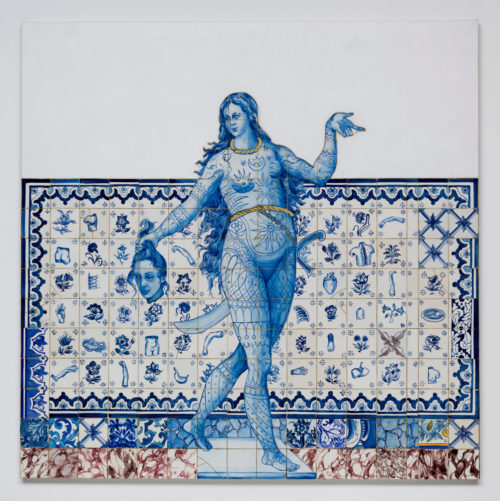
Adriana Varejao
“All reading is projection. But, of course, it is not only projection.”
Peter E. Gordon (Adorno and Existence)
“Mankind which in Homer’s time was an object of contemplation for the Homeric gods, now is one for itself. Its self-alienation has reached such a degree that it can experience its own destruction as an aesthetic pleasure of the first order.”
Walter Benjamin (Art in the Age of Mechanical Reproduction)
“…outside of here is death.”
Samuel Beckett (Endgame)
“The ghost of Hamlet’s father keeps appealing to us lest we forget him and pursue our own desires.”
Rainer Nagele (Reading After Freud)
Adorno’s first dissertation (or first major disseration) was on Kierkegaard, at the urging of Adorno’s University advisor Paul Tillich — and it was published the very day Hitler seized dictatorial powers and the same year that Tillich published his book The Socialist Decision, a book that cost him his teaching position and led to a quick exile to the United States. This was the winter of 1933. Adorno would write three more short pieces on Kierkegaard throughout his life, one not too long before his death.
In Kierkegaard Adorno saw the origin of a line of thinking that Peter Gordon called “bourgeois interiority”. But for Adorno, the key to Kierkegaard was to ignore the religious in favour of a category which is both described and then dismissed by the Dane –the aesthetic. Dismissed as counter to the theistic core of religious awakening.
” Kierkegaard himself, we should recall, conceives of the aesthetic as merely the first and lowest of the three “stages” (as portrayed in Stages on Life’s Way): The individual passes from the aesthetic to the ethical and finally to the religious as the last and highest stage of life.”
Peter E. Gordon (Adorno and Existence)

Sohrab Hura, photography.
Adorno of course inverted this ladder, and saw in how Kierkegaard wrote of aesthetics ‘primitive signs’ for concepts that were never developed. Philosophical concepts. In fact Adorno saw much of Kierkegaard’s writing as unintentional parodies of theological thinking. But regardless of the problematic aspect of religious faith, it was in these passages that Kierkegaard was most accurately historical, that certain social types and class dynamics were revealed.
Now Robert Hullot-Kentor in his introduction to Adorno’s Kierkegaard (which he translated) notes how the idea of domination is linked to sacrifice. A sacrifice of the present to the future. To the abstraction — the particular to the universal. This is very pertinent when considering the current state of Capitalist appropriation of Green issues. And this, as Hullot-Kentor points out, was the message of Dialectic of Enlightenment. Scientific control is caught in the dialectic of sacrifice. Only today the sacrifice is both masochism and nihilism both. For the present is only a shadow of an abstract future, an idea of either salvation or annihilation.

Marie Pascale Gautheron
For Hullot-Kentor, the study of Kierkegaard (a thinker claimed by many later converts to National Socialism) was the first dialectic of enlightenment — for art as the memory of nature as the expression of sacrifice. History then is always a process of transformation into myth. Or in non Adorno language, into nature. Either way it is that from which one is looking to escape. Or that society is looking to neutralize.
For Adorno, the Kierkegaardian leap of faith was the final act of self sacrifice. A submission (in despair) disguised as something else. The current environmental crises, whatever is it that is meant by that term, is highly revealing when looked at aesthetically, if you like. Not as ornament or image but as the dialectic of sacrifice. A sacrifice mediated by both capital (exchange) and by ideological compliance with notions of progress (the Enlightenment).
“Freedom from the economy is nothing else than economic freedom and remains restricted to a small circle of people as a luxury.”
Adorno (tr. Robert Hullot Kentor, Der Begriff des Unbewussten in der transzendentalen Seelenlehre)

Aditya Novali
There is also something in Kierkegaard which is only touched on, or implied, in Adorno’s work on him, and that is the infantile residue in the Dane’s satire. For the rising of global fascism today is, like in 1933, projecting a menace from outside — Islam or terrorism or immigrants. And there is an overflow into bourgeois thinking about ecology.The environment is a stand in for Jew and Bolshevik in a sense. Islam is another register of stand in.
“In opposition to the privations of early high capitalism, the Kierkegaardian intérieur was to encompass “a lost ‘immediacy’” and function “as a romantic island where the individual undertakes to shelter his ‘meaning’ from the historical flood.”
Adorno (Kierkegaard)
The infantile and adolescent entertainments of contemporary western culture are permeated with leftover new age bromides. Some of this is also pandering to the niche Christian audience, but more it is an assumed spirituality connected to bodily self improvement (yoga, spin class, aerobics, etc) in which spiritualism (as Adorno noted) is inverted. ‘Class based asceticism’ as Hullot Kentor put it. Bodily self improvement is guilt and projection both. Fascism arrives in its most comely form, its most photogenic form. The memory of physical labor is recreated as ‘no pain no gain’. The sign of the redeemed is a size six or perfect abs.

Djamel Tatah
“This, to be sure, indicates the crucial reversal. If the body only appears under the sign of the ‘meaning’ of the truth and untruth of spirit, then in return spirit remains bound to the body as its expression.”
Adorno (Kierkegaard)
The scientific future, which is now predictive or prophetic, or both, is couched in ways that erase history. The disavowed material conditions of life return as decoration or infomercial.
“But whereas spirit was driven outward from itself and into dialectical union with the world, the Kierkegaardian soul was driven inward from the world and fell into a changeless space of a nondialectical solipsism.”
Peter E. Gordon (Adorno and Existence)
The 19th century ideal of bourgeois privacy is the stage set for interiority or reflection. And this model lingers even today in the blurry non specific notion of Nature that is addressed in all environmental discourse. The appeal of much green argument is in its depiction or expression of a pastoral Nature. Again the second half of the 19th century is evoked. The bourgeois apartment is, then, a refuge from the untruth of the mass that Kierkegaard saw in society at large.

Pavel Tchelitchew
“Kierkegaard recognized the distress of incipient high- capitalism,” Adorno avers. “He opposed its privations
in the name of a lost immediacy that he sheltered in subjectivity.”
Marcia Morgan (Kierkegaard and Critical Theory)
And…“Kierkegaard, he wrote, “seems to have heard those loudspeakers which filled the Berlin Sportspalast one hundred years later.”
Peter E. Gordan (Adorno and Existence)
There is, then, emergent in Kierkegaard, something which began to fossilize and become sclerotic by mid 20th century. And it appears in two strands. One is American Exceptionalism, and the other is ideas of Nature of origin — an origin that is mediated by this near kitsch evocation of wildness and pristine wilderness. The latter is ambivalent for wilderness is there to make way for progress and American exceptionalism. For technical progress, for domination.
“And the claim to origin is itself the act in which domination insists that, where rights are to be determined, priority must be ceded to what has come prior. As Adorno writes in Negative Dialectics, the category of origin is the “seigniorial, the confirmation of him who stands first because he was there first; of the autochthon against the immigrant, of the settled against the migrant.” In the concept of origin, then, nature is dominated in its own
name.”
Robert Hullot-Kentor (Things Beyond Resemblance)
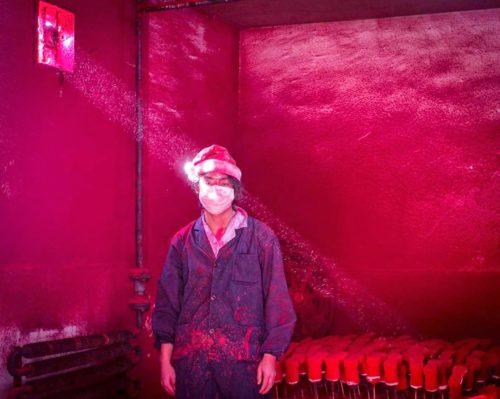
Ronghui Chen, photography. (Christmas ornament factory, China).
The very idea of help, under Capitalism, is fraught with paternalism and class hierarchies. And, not insignificantly, racial hierarchies as well. For the imagination of Nature is saturated with images of colonial nostalgia.
To return to questions of climate change, there is a difficulty in processing the ways in which the discussion shifts the burden for change to the individual. Here is an article that exemplifies the problem. Nowhere is the military mentioned, not once.
https://medium.com/@aarnegranlund/three-things-we-dont-understand-about-climate-change-c59338a1c435

John Constable (Golding Constable’s Flower Garden; 1815).
How is that even possible one might ask? So again, the image of bourgeois interiority sets a backdrop for ideas of “living”, and of community. In these articles, and there are many of them, the interior bourgeois 19th century apartment remains a model, the manor house its extension, and plantation the further extension. And coercion is implied, as well. Though the nature and quality of that coercion varies greatly. Although the very appearance of the Manor House in a landscape implies much.
Allow me a long quote from Hullot-Kentor here…
“For even if one assumes to have long ago soberly jettisoned primogeniture, Mayflower, and polo blazon—even if Adorno’s critique seems as self-evident as the concept of origin, itself the very model of self-evidence—still, any apparently perspicacious understanding of origin may be brought up short when it sets out pragmatically to get on with life as it happens. Knowingly or not, the impulse of industriousness is itself lived in the sweat of a brow
that lays claim to origin:“The raging ethos of labor,” Adorno writes in the same passage of Negative Dialectics quoted above, is evidence of origin’s perduring spell. History, as the course of presumptively unremitting labor, proves to be obligated to origin since labor is the assumed penalty for an initial deviation from truth in the sense of the given precedence of origin.”
Robert Hullot-Kentor (Things Beyond Resemblance)

Werner Heldt. 1949.
Adorno (and Horkeheimer) saw the modern as a search (at the least a secondary search) for the restoration of the archaic, or the primitive. When Karl Krauss wrote ‘origin is the goal’ it was a conservative idea, and Adorno’s great insight was to recognize that the goal provided, in degraded form, the origin. It was only in some deformed manner that an origin was to be articulated, and expressed. Progress, technological promise (always broken) yeilds by some strange (inscrutable) necessity an origin. As Hullot-Kentor noted…“Origin, in any philosophical sense—the epigram now seems to say—wants to relinquish the research of genesis for that of arriving at the new.”
The selling of environmental crises (separate from the actual environmental problems) entails a rewriting of the script of modernity. It must rewrite origins, too. The new is no longer quite the *new*. The trust and belief in technology and its solutions for the future is identical in consequence with a nostalgic new age tree hugging Green luddite piety– as both result in a societal and individual regression. And this is one of the lessons of the *dialectic of Enlightenment*.

Christophe Von Hohenberg, photography.
“Adorno’s critique of modernity and its social manifestation utilizes Freud against the status quo dominated by an analytic understanding conforming to the market, imprisoned by the money changers, locked in a diminishing materialism. Adorno says society runs not in spite of its contradictions but by means of them.”
Julian Van Will (Adorno’s Critical Theory and Psychoanalysis)
This new capitalist project of manufacturing an image of a new (!) future, but one in which only good capital can save mankind, is reminiscent of something Adorno wrote in Negative Dialectics…
“law is the primal phenomenon of irrational rationality. In law the formal principle of equivalence becomes the norm; everyone is treated alike. An equality in which differences perish secretly serves to promote inequality; it becomes the myth that survives amidst an only seemingly demythologized mankind.”
Worth noting that Espen Hammer, who wrote a book titled Adorno and the Political, quotes the passage above and then comments….“However, the premise — that a legal norm is valid for all legal subjects and is supposed to be applied similarly in similar circumstances (which arguably, by the way, is something well worth defending) — does not support the conclusion, namely that the system of positive law actually undermines and destroys individual identities. ”
How is it an Adorno scholar so misses the point here? First, thats not what Adorno is saying. And two, regardless, those fetishized differences that operate in a system predicated on exchange (equivalence) is the necessary alibi for capital’s inherent and absolutely necessary inequality. And an inequality based on principles of class hierarchies. And that class tension (and aggression) must always supersede or subsume the rational conscious intention. Sunday school manners hardly interrupt the silent corruption and blasphemes of the alter boys. Those who find the most acute and delicious pleasure in sabotaging the rationality they so claim to revere.

James Nutt
The principle need of capital for domination won’t change. Salvation becomes the myth of ecological rescue — where secretly the coercion is intensified and a formal request for compliance and duty is a bourgeois descendent of that 19th century living room interior self. For the request is unstated though still formal. The knowledge of the unstated request is proof of respectability. The green washing tendency now is an acute individualizing of a global problem. In fact, the entire use of “global” now is a substitute for individual. This is the infantilzation again. I am the world.
“I believe our daily interactions with smartphones and social media are so pleasurable precisely because they normalize and gratify infantile dispositions. They endorse self-centeredness and inflated exhibitionism. They promote an orientation towards the present, rewarding impulsivity and celebrating constant and instant gratification. They flatter our needs for visibility and provide us with 24/7 personalized attention, while eroding our ability to empathize with others. Whether we use them for work or pleasure, our devices also foster a submissive attitude. In order to take advantage of all they offer, we have to surrender to their requirements, agreeing to “terms” we do not understand and handing over stores of personal data.”
Simon Gottschalk

Hiraki Sawa (Screen shot video).
“The Frankfurt School’s turn to the “underground history” of Europe – that is, to the “fate of the human instincts and passions which are displaced and distorted by civilization”– marked
a radical innovation in social theory. Adding an entire new dimension to Marxism, it pitted the claims of the material body against the (ideological) illusions of theoretical and moral idealism. The widespread focus on the body in social theory over the past several decades appears to be a continuation of that tradition. But a curious reversal has taken place, in which the materialism of the Marxian and the Freudian traditions has been supplanted by a Foucauldian-inspired constructivism. Almost unnoticed, the constructed body has been slipped in to replace the material body. “
Joel Whitebook (Weighty Objects, Cambridge Companion to Adorno)
This has been the de-politicizing of both psychoanalysis, and more to the point here, Marx. The symbolic is seen in Zizek and his acolytes and much seen in gender studies. The politics are gone. And hence, the material world is gone. And hence in his discussion the substitute of the universal for the particular hardly needs to even happen. Nature is not just abstract but it simply doesn’t exist. Freedom was disconnected from science ( and instrumental thinking) and morality was reduced to bourgeois interiority. The floating signifier.
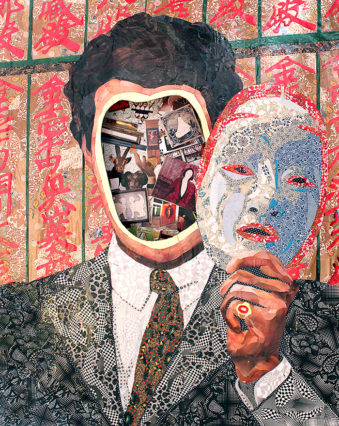
Wesley Duke Lee
The imperialism of the signifier is a terrific term. And it belongs to Peter Dews. But this is a bit beyond the scope of this posting. Suffice it so say for Adorno the subject was to *used* (rather than denied) to break through the illusions of the constitutive subjective (per Adorno). A subjectivity in which, in its relation to what it is not, something is being withheld. That is the truth of its constitutive formation.
“What we differentiate will appear divergent, dissonant, negative for just as long as the structure of our consciousness obliges it to strive for unity.”
Adorno (Negative Dialectics)
This is important in the context of this post because that differentiating is then experienced in multiple registers, and contradiction entails in all of them a sense of guilt for having wanted to unify (dominate) in the first place. The Green vision is to be free of industrial pollutants and to rightly do away with pesticides and fungicides — but the very construction of Utopian futures is itself domination at some level. And perhaps the dialectic of enlightenment ends up very pertinent to Green thinking.
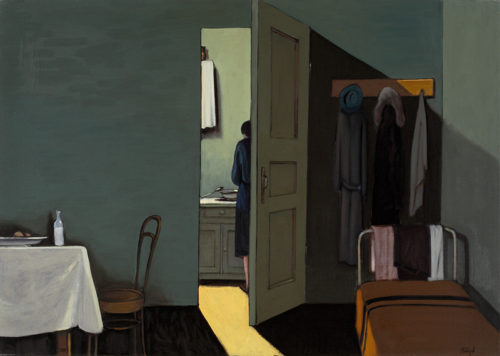
Viktor Pivovarov
“Philosophical reflection is the conscious form of the unconscious experience of guilt and debt; thus, philosophical reflection, in experiencing contradiction, experiences it as the token of a past violence that as such requires, as Melanie Klein would have it, reparation.”
J.M. Bernstein (Negative Dialectic as Fate)
This experience of contradiction is inevitable in capitalist society. It is constant and all encompassing. There is class antagonism and there is the broken promise of autonomy and the answer of control. The horizon being created by environmental scientists is one that seems insistent on technological and scientific solutions. The counter position, as I said above, is the return to simplicity and neo luddite values. Both unfold as expressions of something found in Kierkegaard. Both are, to echo Adorno and Horkheimer, a regression to myth.

Jan Fabre
Writing on Adorno’s critique of Kierkegaard, Susan Buck Morss quotes Adorno…“Thus the flanneur goes for a walk in the room; reality appears to him simply as reflected out of mere inwardness.” A scene from Kierkegaard in which a father and son stroll their apartment pretending it is the boulevard outside.
“The bourgeois interieur has no room in which to unfold. It exists, once and for all, frozen, the still-life of a furniture arrangement, and thereby provides the concrete image of the “indifference” between subject and object.”
Susan Buck Morss (The Origin of Negative Dialectics)
Allow me here a long-ish quote from Guy Debord..from his Comments on the Society of the Spectacle, circa late 1980s.
“The empty debate on the spectacle – that is, on the activities of the world’s owners – is thus organised by the spectacle itself: everything is said about the extensive means at its disposal, to ensure that nothing is said about their extensive deployment. Rather than talk of the spectacle, people often prefer to use the term ‘media’. And by this they mean to describe a mere instrument, a kind of public service which with impartial ‘professionalism’ would facilitate the new wealth of mass communication through mass media – a form of communication which has at last attained a unilateral purity, whereby decisions already taken are presented for passive admiration. For what is communicated are orders; and with perfect harmony, those who give them are also those who tell us what they think of them.”
As Debord said then, there was an entire generation moulded to the laws of the spectacle. To mass media, to digital media… then just appearing. The dialectic has narrowed, in a sense. And another aspect of Green futures as they occur under the sign of the Spectacle is that all has been handed over to specialists and engineers. Sometimes those specialists are only specialists in the most insanely constricted fields. Specialists of specialties.
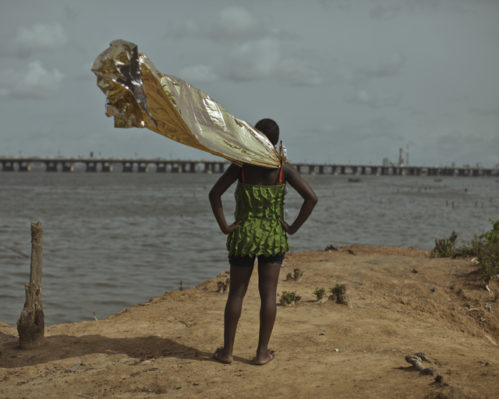
Christina DeMiddle, photography.
“With the destruction of history, contemporary events themselves retreat into a remote and fabulous realm of unverifiable stories, uncheckable statistics, unlikely explanations and untenable reasoning. For every imbecility presented by the spectacle, there are only the media’s professionals to give an answer, with a few respectful rectifications or remonstrations.”
Guy Debord (Comments on Society of the Spectacle)
Somehow the ecological crises has taken on the form of an enemy of the good, of the wholesome state. Even those intimately aware of the state and its flaws, construct a narrative for Green solutions that follows along this line. For National Socialism the enemy was the figure of the dirty rodential Jewish Bolshevik. The figure today is split between the deniers… the scarlett/Green letter group and Nature as wounded and made sick by man and history, if history is even considered in the slightest. Or Nature as something to do battle with — like alien invaders. In both cases a certain reliance on experts. And as Debord says, all experts work for the state. They all lie, and they often are uncertain of their own lies and truths.
The subject living under the shadow of this generalized threat from Nature will retreat, as did Kierkegaard’s father and son, out of the lights of the boulevard and inside to be bathed in the blue light of their various screens. And in the same way, the indifference between subject and object is revisited.
Today, the control of media allows for absolute revisionist histories to become entrenched and indelible. Search Google and you get a carefully curated list of answers. The official accepted version of events will often be of a circular logic, and predicated on the word of experts. Even experts known to be serial liars. The dissident voice is not attacked but erased. Those not inside the system are, as Debord noted, automatically enemies of the system. The fact that Global Warming is now a mainstream topic ought to cause at least a momentary pause. For once the mass media giants begin to talk about something it is pretty certain they already own it. So the enemy of mankind — i.e. the individual, you and me — is something global, universal. It is Nature. And it is being given a narrative crafted by anonymous technicians of the state. Independent expert is an oxymoron.

Dylan Lewis, photography.
“The spectacle makes no secret of the fact that certain dangers surround the wonderful order it has established. Ocean pollution and the destruction of equatorial forests threaten oxygen renewal; the earth’s ozone layer is menaced by industrial growth; nuclear radiation accumulates irreversibly. It merely concludes that none of these things matter. “
Guy Debord (Comments on the Society of the Spectacle)
Whatever the reality of ecological dangers, the state almost certainly has contingency plans. It already has a surplus population of unemployed and allowing for certain catastrophes is only logical. Domestic refugee interment camps absolutely already exist. The state may not even know the extent of certain dangers. It may also be manufacturing some of them. The public has no idea. All of the passionate claims about climate change or melting arctic ice or insect depletion is only individual neurosis. All concerned people rely on experts. Often if not usually multiple experts. Armies of experts. They rely on science, on scientists most of whom are funded directly or indirectly by the government. The only solution is to address at grass roots levels things that can be reliably ascertained. The pollution of local drinking water for example. But implicated here are things such as housing costs. The price of shelter and food. When the secrecy of the military and defense contractors is so extreme and so absolute, the real extent of damage to various eco-systems is impossible, literally, to even guess at. The best guess is that there are acute and critical problems — but details are unreliable and these problems extraordinarily complex. But local organizing IS possible. For once institutional and corporate involvement is implicated — at whatever level, it is pretty certain that integrity is compromised. For a populous unable to ween itself from screen distractions, it is asking a lot to expect informed commentary or strategies. And the rise of fascism is perfectly logical. For the enemy is always out there. Is always an ‘other’.

Billy White
There is a tendency in much liberal collaborationist postures to also incorporate a new sort of Puritanism. Art and culture are seen as potential enemies, partly because mass corporate culture is merely advertising or overt propaganda. For the educated classes of the West, the liberal white voter, the propaganda is tolerated if not embraced. And the ever shrinking avant garde of culture is increasingly experienced as borderline immoral (since somehow the time spent writing or painting should be spent lowering one’s carbon footprint or whatever).
“He (Adorno)claimed that the unity characterizing the bourgeois subject and the traditional work of art was forced and therefore false or artificial. In both cases, the integration of the whole – and the appearance of harmony – was achieved by “suppressing and excluding that which is disparate or cannot be integrated, that which remains unarticulated and repressed.”
Joel Whitebook (Weighty Objects)
The indifference of the bourgeois burghers of today toward any psychic synthesis — a recuperation between subject and object — is marked. And following Debord we are now in the fourth generation wholly subservient to the law of the spectacle. Adorno said in Minima Moralia: ..:“morality is to not be at home in one’s home.”

Katja Novitskova
“The problem of the false for critique can be stated as follows: it is not just the lie that lies, it is the truth that lies. { } It is along similar lines that Horkheimer and Adorno speak of deception ‘as a mode of exchange in which everything proceeds as it should, where the contract is fulfilled and yet the other party is deceived’; just as Ulysses’ escape from the sirens can be compared to finding ‘an escape clause in a contract, which enables him to fulfill it while eluding it’. What I am suggesting is that running alongside the dialectic of Enlightenment is a dialectic of deception,”
Ackbar Abbas (Adorno and the Weather)
“Equally, the shadow of the altered ego falls on objects and object relations. Sublimation is a kind of reconciliation of the subject-object dichotomy . . . and a narrowing of the gulf
between object libido and narcissistic libido, between object world and self.”
Hans Loewald (Sublimation: An Inquiry into Theoretical Psychoanalysis)
In other words, aesthetic resistance is vitally important. Psychological health is important. Taste is important. For dissent is the voice of class analysis now. And there are aspects of learning how to read, how to interpret, without which fascism simply advances without obstacle.

Kierkegaard’s tombstone. Assistens Cemetery, Copenhagen, Denmark (photo by John Steppling)
I am teaching a theatre workshop in late September (dates yet to be finalized) in Los Angeles. If you have any interest, please send me an email. Cost and duration also yet to be finalized.
To donate to this blog use the paypal button at the top of the page. And thanks to those who have and to those who may in the future. It is appreciated.

Seems to me the ecological , climate crisis is all too real sadly, but agree that the response to it is just more of the thinking that led to it in the first place. Like Kieerkegard in Fear and Trembling trying understand how God could want the sacrifice of an innocent to please him, what purposes it served, what it means, when he should have been trying why society generated such a myth in the first place
yeah chris, I dont question there is a crises. I no longer know the parameters of that crises. I always think of the california wild fires last summer. That was more about pacific gas and electric….and power lines over a hundred years old….then it was temperatures rising. But then you also had a few years of drought and semi drought. So that is the complexity part. But i do question all the predictions coming out of various scientific institutes or even individuals: I think they don’t know. And as debord said, they largely dont care. Which begs questions about the pathology of the ruling class.
trend #1……https://fashionunited.uk/news/fashion/these-are-the-top-10-global-consumer-trends-in-2019/2019011641057
The bottom line for schizophrenic Western man and woman is fear of death. Prolong it, deny it, oppose it. You can’t escape it. So much of what is behind human folly is an act out to secure immortality. Five years after you die, few remember you even existed. Doesn’t matter who you are, what you did unless your life really made a difference. Like MLK but even his persona has been changed to a kind of benign grandfather. So essentially he is not remembered either. Schools do not teach history any more. The earth will continue once we have wiped ourselves off the face of it…screaming “I don’t want to die”. You’re going to. No way around it.
That’s a good point Fabiola, so why don’t we just stop fucking breathing, because we’re going to die anyway